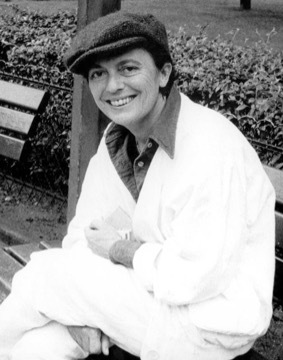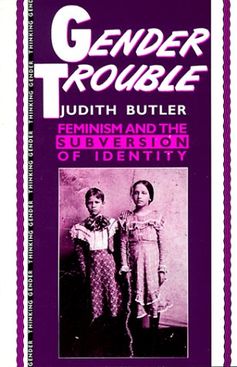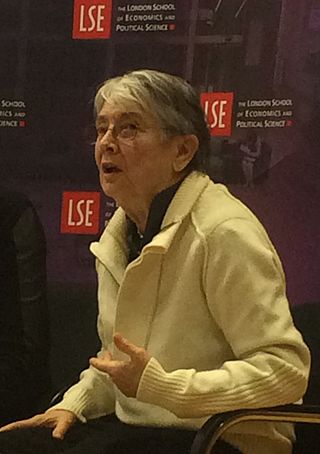Gender studies is an interdisciplinary academic field devoted to analysing gender identity and gendered representation. Gender studies originated in the field of women's studies, concerning women, feminism, gender, and politics. The field now overlaps with queer studies and men's studies. Its rise to prominence, especially in Western universities after 1990, coincided with the rise of deconstruction.
Queer theory is the perspective that questions the perception that cisgender and heterosexual identities are in any sense "standard". It revisits such fields as literary analysis, philosophy, and politics with a "queer" approach.
Anarcha-feminism, also known as anarchist feminism or anarcho-feminism, is a system of analysis which combines the principles and power analysis of anarchist theory with feminism. It closely resembles intersectional feminism. Anarcha-feminism generally posits that patriarchy and traditional gender roles as manifestations of involuntary coercive hierarchy should be replaced by decentralized free association. Anarcha-feminists believe that the struggle against patriarchy is an essential part of class conflict and the anarchist struggle against the state and capitalism. In essence, the philosophy sees anarchist struggle as a necessary component of feminist struggle and vice versa. L. Susan Brown claims that "as anarchism is a political philosophy that opposes all relationships of power, it is inherently feminist".
Women's studies is an academic field that draws on feminist and interdisciplinary methods to place women's lives and experiences at the center of study, while examining social and cultural constructs of gender; systems of privilege and oppression; and the relationships between power and gender as they intersect with other identities and social locations such as race, sexual orientation, socio-economic class, and disability.

Lesbian feminism is a cultural movement and critical perspective that encourages women to focus their efforts, attentions, relationships, and activities towards their fellow women rather than men, and often advocates lesbianism as the logical result of feminism. Lesbian feminism was most influential in the 1970s and early 1980s, primarily in North America and Western Europe, but began in the late 1960s and arose out of dissatisfaction with the New Left, the Campaign for Homosexual Equality, sexism within the gay liberation movement, and homophobia within popular women's movements at the time. Many of the supporters of Lesbianism were actually women involved in gay liberation who were tired of the sexism and centering of gay men within the community and lesbian women in the mainstream women's movement who were tired of the homophobia involved in it.
Feminist geography is a sub-discipline of human geography that applies the theories, methods, and critiques of feminism to the study of the human environment, society, and geographical space. Feminist geography emerged in the 1970s, when members of the women's movement called on academia to include women as both producers and subjects of academic work. Feminist geographers aim to incorporate positions of race, class, ability, and sexuality into the study of geography. The discipline has been subject to several controversies.
Feminist theory is the extension of feminism into theoretical, fictional, or philosophical discourse. It aims to understand the nature of gender inequality. It examines women's and men's social roles, experiences, interests, chores, and feminist politics in a variety of fields, such as anthropology and sociology, communication, media studies, psychoanalysis, political theory, home economics, literature, education, and philosophy.
Marxist feminism is a philosophical variant of feminism that incorporates and extends Marxist theory. Marxist feminism analyzes the ways in which women are exploited through capitalism and the individual ownership of private property. According to Marxist feminists, women's liberation can only be achieved by dismantling the capitalist systems in which they contend much of women's labor is uncompensated. Marxist feminists extend traditional Marxist analysis by applying it to unpaid domestic labor and sex relations.
Socialist feminism rose in the 1960s and 1970s as an offshoot of the feminist movement and New Left that focuses upon the interconnectivity of the patriarchy and capitalism. However, the ways in which women's private, domestic, and public roles in society has been conceptualized, or thought about, can be traced back to Mary Wollstonecraft's A Vindication of the Rights of Woman (1792) and William Thompson's utopian socialist work in the 1800s. Ideas about overcoming the patriarchy by coming together in female groups to talk about personal problems stem from Carol Hanisch. This was done in an essay in 1969 which later coined the term 'the personal is political.' This was also the time that second wave feminism started to surface which is really when socialist feminism kicked off. Socialist feminists argue that liberation can only be achieved by working to end both the economic and cultural sources of women's oppression.

Monique Wittig was a French author, philosopher and feminist theorist who wrote about abolition of the sex-class system and coined the phrase "heterosexual contract". Her groundbreaking work is titled The Straight Mind and Other Essays. She published her first novel, L'Opoponax, in 1964. Her second novel, Les Guérillères (1969), was a landmark in lesbian feminism.

Gender Trouble: Feminism and the Subversion of Identity is a book by the philosopher Judith Butler in which the author argues that gender is performative, meaning that it is maintained, created or perpetuated by iterative repetitions when speaking and interacting with each other.
Materialist feminism, as a discipline, studies patriarchy in terms of material sexual and economic benefits afforded to men at the expense of women through the mechanism and construction of gender. As a movement, materalist feminism is a part of radical feminism, thus founded for the abolition of patriarchy, mainly in France and Italy.
Sheila Jeffreys is a former professor of political science at the University of Melbourne, born in England. A lesbian feminist scholar, she analyses the history and politics of human sexuality.

Christine Delphy is a French feminist sociologist, writer and theorist. Known for pioneering materialist feminism, she co-founded the French women's liberation movement in 1970 and the journal Nouvelles questions féministes with Simone de Beauvoir in 1981.

Angela McRobbie is a British cultural theorist, feminist, and commentator whose work combines the study of popular culture, contemporary media practices and feminism through conceptions of a third-person reflexive gaze. She is a professor of communications at Goldsmiths College, University of London.

Heidi I. Hartmann is an American feminist economist who is founder and president emerita of the Washington-based Institute for Women's Policy Research (IWPR), a research organization created to conduct women-centered, public policy research. She retired from her position as President and CEO in 2019.
Gender essentialism is a theory which attributes distinct, intrinsic qualities to women and men. Based in essentialism, it holds that there are certain universal, innate, biologically based features of gender that are at the root of many of the group differences observed in the behavior of men and women. In Western civilization, it is suggested in writings going back to ancient Greece. With the advent of Christianity, the earlier Greek model was expressed in theological discussions as the doctrine that there are two distinct sexes, male and female, created by God, and that individuals are immutably one or the other. This view remained largely unchanged until the middle of the 19th century. This changed the locus of the origin of the essential differences from religion to biology, in Sandra Bem's words, "from God's grand creation [to] its scientific equivalent: evolution's grand creation," but the belief in an immutable origin had not changed.
Feminist political theory is an area of philosophy that focuses on understanding and critiquing the way political philosophy is usually construed and on articulating how political theory might be reconstructed in a way that advances feminist concerns. Feminist political theory combines aspects of both feminist theory and political theory in order to take a feminist approach to traditional questions within political philosophy.
Feminist ethics is an approach to ethics that builds on the belief that traditionally ethical theorizing has undervalued and/or underappreciated women's moral experience, which is largely male-dominated, and it therefore chooses to reimagine ethics through a holistic feminist approach to transform it.

Ecofeminism is a branch of feminism and political ecology. Ecofeminist thinkers draw on the concept of gender to analyse the relationships between humans and the natural world. The term was coined by the French writer Françoise d'Eaubonne in her book Le Féminisme ou la Mort (1974). Ecofeminist theory asserts a feminist perspective of Green politics that calls for an egalitarian, collaborative society in which there is no one dominant group. Today, there are several branches of ecofeminism, with varying approaches and analyses, including liberal ecofeminism, spiritual/cultural ecofeminism, and social/socialist ecofeminism. Interpretations of ecofeminism and how it might be applied to social thought include ecofeminist art, social justice and political philosophy, religion, contemporary feminism, and poetry.







